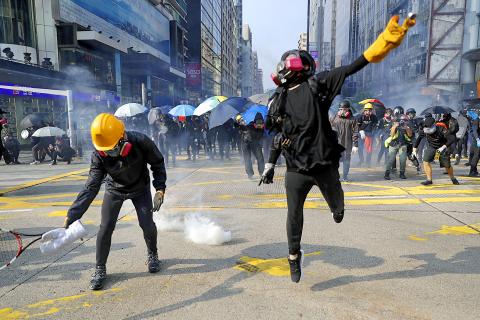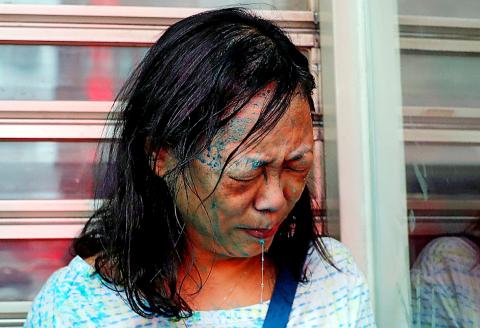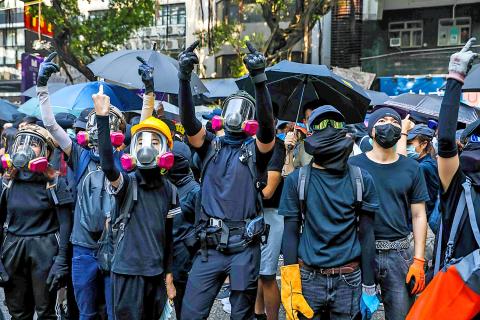Hong Kong protesters yesterday flooded the territory’s streets in defiance of a ban by the authorities on their march, setting up roadblocks and tossing firebombs amid the firing of tear gas by police.
Tens of thousands of people marched down Nathan Road in Tsim Sha Tsui to West Kowloon, despite a police ban on the event because of the potential for violence.
The rally was originally called to protest a government law forbidding the use of masks at demonstrations, and came after Wednesday’s attack on Civil Human Rights Front’s organizer Jimmy Sham (岑子傑).

Photo: AP
Protest leaders carried a black banner at the front of the procession that read, “Five main demands, not one less,” as they pressed their calls for accountability and political rights.
Black-clad and masked protesters barricaded streets at multiple locations in Kowloon, where the territory’s subway operator restricted passenger access.
The protesters tore off stones from the sidewalk and scattered them on the road, commandeered plastic safety barriers and unscrewed metal railings to form makeshift roadblocks.

Photo: Reuters
They sang the protest movement’s anthem and held up placards depicting the Chinese flag as a Nazi swastika.
Police inside the Tsim Sha Tsui police station fired volleys of tear gas and used a loudspeaker to call on protesters in the street below to disperse.
Hardcore black-clad protesters threw firebombs at the station’s iron gate and inside the compound.

Photo AFP
Police also fired tear gas after gasoline bombs were thrown toward one subway station.
A water cannon truck and armored car led a column of dozens of police vans down Nathan Road, stopping frequently to spray liquid tinted blue as they moved to clear the road of protesters and barricades.
Residents jeered at riot police walking alongside the vehicles, cursing them and telling them to leave.
The officers, in turn, told people they were part of an illegal assembly and warned them to leave, and unleashed rounds of tear gas in an attempt to disperse the crowds.
Along the way, protesters trashed outlets of a discount grocery chain because of what they say is its pro-Beijing ownership. They also tried to set fire to ATMs and branches of mainland Chinese banks, setting off sprinklers in at least two.
As night fell, protesters returned to the streets, setting trash on fire in intersections. Police responded with more tear gas.
Matthew Lee, a university student, said he was determined to keep protesting even after more than four months.
“I can see some people want to give up, but I don’t want to do this, because Hong Kong is my home, we want to protect this place, protect Hong Kong,” he said. “You can’t give up, because Hong Kong is your home.”
Many of the protesters wore masks in defiance of a recently introduced ban on face coverings at public gatherings, and volunteers handed more out to the crowd.
Organizers said they wanted to use their right to protest as guaranteed by the territory’s Basic Law, despite the risk of arrest.
“We’re using peaceful, rational, nonviolent ways to voice our demands,” Front convener Figo Chan (陳皓桓) told reporters. “We’re not afraid of being arrested. What I’m most scared of is everyone giving up on our principles.”

The CIA has a message for Chinese government officials worried about their place in Chinese President Xi Jinping’s (習近平) government: Come work with us. The agency released two Mandarin-language videos on social media on Thursday inviting disgruntled officials to contact the CIA. The recruitment videos posted on YouTube and X racked up more than 5 million views combined in their first day. The outreach comes as CIA Director John Ratcliffe has vowed to boost the agency’s use of intelligence from human sources and its focus on China, which has recently targeted US officials with its own espionage operations. The videos are “aimed at

STEADFAST FRIEND: The bills encourage increased Taiwan-US engagement and address China’s distortion of UN Resolution 2758 to isolate Taiwan internationally The Presidential Office yesterday thanked the US House of Representatives for unanimously passing two Taiwan-related bills highlighting its solid support for Taiwan’s democracy and global participation, and for deepening bilateral relations. One of the bills, the Taiwan Assurance Implementation Act, requires the US Department of State to periodically review its guidelines for engagement with Taiwan, and report to the US Congress on the guidelines and plans to lift self-imposed limitations on US-Taiwan engagement. The other bill is the Taiwan International Solidarity Act, which clarifies that UN Resolution 2758 does not address the issue of the representation of Taiwan or its people in

US Indo-Pacific Commander Admiral Samuel Paparo on Friday expressed concern over the rate at which China is diversifying its military exercises, the Financial Times (FT) reported on Saturday. “The rates of change on the depth and breadth of their exercises is the one non-linear effect that I’ve seen in the last year that wakes me up at night or keeps me up at night,” Paparo was quoted by FT as saying while attending the annual Sedona Forum at the McCain Institute in Arizona. Paparo also expressed concern over the speed with which China was expanding its military. While the US

SHIFT: Taiwan’s better-than-expected first-quarter GDP and signs of weakness in the US have driven global capital back to emerging markets, the central bank head said The central bank yesterday blamed market speculation for the steep rise in the local currency, and urged exporters and financial institutions to stay calm and stop panic sell-offs to avoid hurting their own profitability. The nation’s top monetary policymaker said that it would step in, if necessary, to maintain order and stability in the foreign exchange market. The remarks came as the NT dollar yesterday closed up NT$0.919 to NT$30.145 against the US dollar in Taipei trading, after rising as high as NT$29.59 in intraday trading. The local currency has surged 5.85 percent against the greenback over the past two sessions, central